| Release List | Reviews | Price Search | Shop | Newsletter | Forum | DVD Giveaways | Blu-Ray/ HD DVD | Advertise |
| Reviews & Columns |
|
Reviews DVD TV on DVD Blu-ray International DVDs Theatrical Reviews by Studio Video Games Features Collector Series DVDs Easter Egg Database Interviews DVD Talk TV DVD Talk Radio Feature Articles Columns Anime Talk DVD Savant HD Talk Horror DVDs Silent DVD
|
DVD Talk Forum |
|
|
| Resources |
|
DVD Price Search Customer Service #'s RCE Info Links |
|
Columns
|
 |
The Best of Soul Cinema |

|
MGM Home Entertainment All Color / 62.96 the set or 14.95 each
Reviewed by |
This cheesy set of four prime examples and one spoof of '70s blaxsploitation movies has 'fun' written all over it. The leopard skin box can't help but grab one's attention - it's too clever to be lame.
There's a straight gangster tale and a high school nostalgia film in the mix, but the two most famous titles are the starmaking vehicles for Pam Grier, the queen of 70s black cinema.
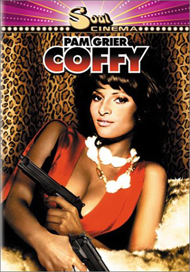
|
Coffy 1973 / 1:66 letterboxed flat / 90 min. Starring Pam Grier, Booker Bradshaw, Robert Doqui, William Elliott, Allan Arbus, Sid Haig Cinematography Paul Lohman Production Designer Perry Ferguson II Editor Charles McClelland Original Music Roy Ayers Produced by Robert A Papazian, Salvatore Billittieri Written and Directed by Jack Hill |
Coffy is a key blaxploitation movie. Warners' Cleopatra Jones preceded it, but Pam Grier's image is more interesting. Her Coffy is exploitative and liberating at the same time. The revenge tale here is fairly primitive, and by 1973 the black anger thing was fairly well worn out as a device that could carry a film by itself. Self-parody became an important element almost from the beginning, with Shaft having fun with its hero's masculine image, and Cotton Comes to Harlem not afraid to include among its comedy targets Calvin Lockhart as a phony exploiter of Black Pride. Coffy manages to play it straight, on its own terms.
Writer/director Jack Hill came out of Roger Corman obscurity with this inner-city hit. His script is a basic revenge tale, but Pam Grier's character is a good example of how exploitation filmmaking can resonate politically. Coffy shotguns bad guys, hides a pistol in her bra, and catfights with the best of them while maquerading as a whore, but she retains a certain dignity. Black actors were finally allowed to play leading roles in films like these, but many must have found it demeaning to have to work with a new set of stereotypes - the characters are all oversexed to the point of parody, and crime, drugs and sex seemed to be their whole life.
Grier's screen persona came through all this with her pride intact, too beautiful and determined to be dragged down by any of it. In feminist terms, pictures like Coffy seemed a big step backwards, with its black heroine using sex and violence to further her aims. Grier (at the time) wasn't much of an actress - her dialogue delivery is often poor, but she has a star quality that separates her from the rest of the women in exploitation. I remember talking to actresses at UCLA who said they were only asked two things at their auditions - will they do nudity and did they know martial arts? Grier transcends all that with attitude and the self-possession that came from being a top fashion model.
Coffy is a cheap film, and only Jack Hill's smart script and efficient direction save it. He gets good mileage from his paltry budget, and the costumes and music help gloss over some inadequate locations and settings. The big-cheese mafioso in this picture stops at some pretty drab hotels. The casting is mostly excellent, with Robert DoQui (RoboCop) wearing the most ludicrous pimp wardrobe ever seen in a non-comedy and still making his character work. Hill regular Sid Haig (Spider Baby) makes a credibly formidable baddie. Among DoQui's stable of prostitutes, all of whom who get their tops ripped off in a big fight, is Linda Haynes, known to marginal film freaks for her overseas role in Toho's Latitude Zero.
MGM's DVD of Coffy is a decent transfer but is not given 16:9 enhancement. The interesting feature is the commentary by director Hill. He enthusiastically gives us the lowdown on how the picture was made and is quick to point out that as a white man shooting a 'black' film, he knew that his cast was in a position to suggest details he could never figure out for himself. Thus Coffy at one point puts razor blades in her hair before a girlfight, and sharpens a hair clip as a throat-slashing weapon.
Quentin Tarantino's Jackie Brown revived Grier's career and cemented her fame. That respectful star vehicle for his teenage dream girl far outdistances anything seen here, but Coffy is essential to understanding Quentin's obsession with 70s pulp exploitation.
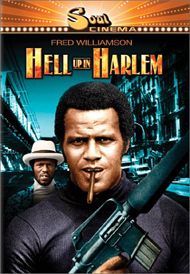
|
Hell Up In Harlem
1973 / 1:85 enhanced for 16:9 / 94 min. Starring Fred Williamson, Julius W. Harris, Gloria Hendry, Margaret Avery, D'Urville Martin, Tony King, Gerald Gordon, Bobby Ramsen Cinematography Fenton Hamilton Production Designer Larry Lurin Editors Franco Guerri, Peter Holmes Original Music Fonce Mizell, Freddie Perren Written, Produced and Directed by Larry Cohen |
Hell Up In Harlem is the sequel to Black Caesar and the second dip into blaxploitation cinema by genre maverick Larry Cohen (The Winged Serpent, It's Alive), another white director benefiting from blaxploitation filmmaking. For about the first half, it's a fairly rousing actioner doing good work within an old genre. Cohen's script has plenty of clunker lines but an excellent characterization by Julius Harris as Fred Williamson's gangster father. Energetic and ambitious actor Williamson kept making films for years but never broke out of the blaxploitation mold; here he moves well and looks sharp in the fashionwear (particularly the dapper hats) but can't act much beyond an engaging smile.
The plot has some nice twists like a hostage-taking visit to the Harlem hospital, but familiarity takes over as the swinish D.A. keeps coming back to frustrate our gangster heroes. The perverse 'family' theme in blaxploitation movies is once again put into play. Tommy Gibbs only makes mistakes when the bad guys are able to fool him about who is and who isn't loyal to him. Poor Gloria Hendry loses her kids, and we're supposed to think it justice because the ba-ad woman doesn't deserve them. But hot stud Williamson can do as he pleases.
The action is halfway reasonable, with Cohen's camera hiding the seams in the weak stuntwork. There are plenty of iffy gags as when cel animation is used for a laughable wound effect. Gibbs kills an exclusive bigtime Mafioso who just happens to be sunning himself unguarded among thousands of ordinary bathers at Coney Island. A mafia villa 'near the Florida keys' looks more like a fogbound Long Island. Williamson and his gangsters pull off all kinds of shootings in and around Times Square, and never have to contend with any inconvenient cops showing up. The unwritten law of blaxploitation - always give the black man the last word in clashes with whitey - results in several scenes where Gibbs or his men intimidate, punch out, and even murder cops without consequence.
Besides that, Hell Up In Harlem is unusually tidy for a genre movie. There's hardly any swearing, and only a bit of nudity. Gloria Hendry appears at the beginning wearing a sexy sweater and gets slapped by the D.A. ("Bitch!") ... the shootouts have lots of fake blood and that's about it.
MGM's Soul Cinema box text announces 'Music Edited for Home Video.' I do hear vocals singing plot-specific songs, including the title song, but don't know if it's Edwin Starr or not. Perhaps some other cue along the way was dropped for legal purposes.
Larry Cohen provides a commentary that should prove illuminating - he's an opinionated guy with a lot to say about the production. Actors Hendry and Julius Harris appeared in the James Bond epic Live and Let Die, released the same year.
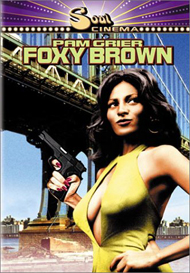
|
Foxy Brown 1974 / 1:85 enhanced for 16:9 / 91 min. Starring Pam Grier, Peter Brown, Terry Carter, Kathryn Loder, Harry Holcombe Editor Chuck McClelland Original Music Willie Hutch Produced by Buzz Feitshans Written and Directed by Jack Hill |
Foxy Brown has fancier titles and more garish 70s outfits for Pam Grier to wear, but doesn't improve on the previous year's Coffy. As director/writer Jack Hill explains on the commentary track, American International had the attitude that black audiences didn't want quality in their movies, and put together a sequel deal that left Hill with less money and almost no time to prepare. Although the film is better than competently directed, Hill's rough script lacks cohesion and climaxes in a drug connection scene where the rich gangsters suddenly drive cars ready for the junkyard.
Grier gets roughed up again and fights a number of foes when not strutting her stuff in 'black' fashions, and predictably comes out on top. But the script drops the ball by dragging in unconvincing Black Panther substitutes as neighborhood vigilantes, while requiring the poorly-drawn baddies to not recognize Foxy after not one but two violent confrontations.
The cast now includes some good talent (the excellent Antonio Fargas, TV actor Peter Brown) but must use stuntmen in other physical roles. Juanita Brown starred in the same year's Caged Heat, the first feature from Jonathan Demme. Sid Haig is back as another surly bad guy. Marie Windsor lookalike Kathryn Loder isn't very effective as a racket boss with jealousy issues, but nobody could handle such a ridiculous character.
(spoiler)Hill's finish has the good guys get back at the main drug pusher by cutting off his ... uh, emasculating him and sending his evil girlfriend the souvenir in a pickle jar. It's a pretty ugly spectacle that became a standard scene in the lowest of blaxploitation films, and doesn't do anything for Hill's reputation. 1
MGM gives Foxy Brown a nice 16:9 transfer even though it's even less visually distinguished than Coffy. The gaudy but tasteless title sequence shows where the money went. A terrific trailer with rhymed jive-talk banter describing Foxy is fall-down funny, better than a blaxploitation parody.
Jack Hill's commentary is sparse this time around, as he's not nearly as proud of this film as he was of Coffy. He was paid more, but was hired at the last moment and shown the door as soon as filming was complete. Hill has praise for his cast but none for his own rushed screenplay. He has little to say about the producers at AIP, probably because he can't think of anything positive.
The DVD cover art features a bridge that doesn't appear anywhere in the movie, that I can see.
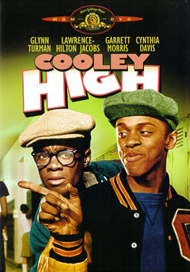
|
Cooley High
1975 / 1:37 flat full frame / 107 min. Starring Glynn Turman, Lawrence-Hilton Jacobs, Garrett Morris, Cynthia Davis Cinematography Paul Vombrack Editor Christopher Holmes Original Music Freddie Perren Written by Eric Monte Produced by Steve Krantz Directed by Michael Schultz |
This very popular teen comedy-drama is more than a little depressing. It's not 'blaxploitation' in that it's not a fantasy of power or entitlement, but it still seems an exploitative piece produced by whites.
Cooley High shares American Graffiti's exaggeration of teenage myths and mating rituals. There's plenty here that's recognizably real and honestly felt. Some of the sentimental stuff is good, as when Preach escapes being whipped by his mother (for having a naked girl in his bedroom!) because she works three jobs and falls asleep before punishment can be carried out. The guys have little to be proud of beyond their interpersonal loyalties and the various mischief and ripoffs they can get away with. We feel sorrier for the girlfriends in their 1964 shift dresses and fake-fur coats, trying to maintain some kind of dignity in neighborhoods where everyone calls them whores just for being female. The boys have so little respect for themselves, they deny it to their girlfriends with constant lies and subterfuge.
For a film that charmed black audiences, Cooley High has a number of elements that I'm surprised weren't tagged as racist. The boys constantly gamble like the stereotypes seen in old Hollywood movies. A trip to the zoo while skipping school has our heroes clowning in front of the gorilla cage, and comparing each other to the big black apes. Cynthia Jones is considered the most attractive girl in the film, and she's very light-skinned. Cooley High isn't afraid to present some aspects of black urban culture denied by the P.C. types. Even as it glamorizes its petty criminal heroes, it does have a certain harsh honesty.
The film doesn't whitewash the boys by making them squeaky clean, and is not the kind of nostalgia that progressive black educators would encourage. It acknowledges that some black teens sleep around and break the law and yet aren't total outlaws. As clumsy as it is, Cooley High has to be seen as a legit alternative to the Bill Cosby philosophy of black entertainment. In a 1970s landscape where 99% of black-oriented movies featured heroes brandishing giant chrome guns, this is at least a step in the right direction.
Glyn Turman and Lawrence-Hilton Jacobs are good actors, and their main girlfriends are afforded little nods toward complexity. Most of the other characters are thin cyphers - the young member of the gang always being treated as a kid, the fat girl at the party who exists to be seen stuffing food in her mouth. The film ends with a forced tragedy clearly meant to supply experienced actor Turman with a star-making opportunity, but the writing is just too thin. At the finish, patronizing American Graffiti-like 'future fates' for the stars are flashed on the screen. The 'bad' guys get an audience-pleasing demise, while we're assured that our hero Preach becomes a big Hollywood star, presumably the stereotyped ultimate goal for inner city audiences.
MGM's Soul Cinema DVD of Cooley High is a plain-wrap adapted pan-scan transfer that looks too tight when cropped on a 16:9 television. Of all the films in the collection, it would likely attract the largest audience, so the compromised presentation is a disappointment. Its stars are serious actors with admirable creative credits and are still active. Some kind of commentary would have been welcome, as we don't get many first-person opinions about the blaxploitation years. The film's Motown-heavy soundtrack appears to be intact, with its original Smokey Robinson tunes.
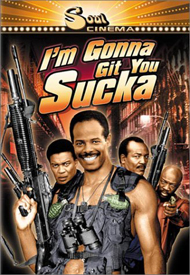
|
I'm Gonna Git You Sucka 1988 / 1:85 letterboxed flat / 89 min. Starring Keenen Ivory Wayans, Bernie Casey, Antonio Fargas, Isaac Hayes, Jim Brown, Janet DuBois Cinematography Tom Richmond Editor Michael R. Miller Original Music David Michael Frank Produced by Raymond Katz, Eric I Gold, Eric Barrett, Tamara Rawitt, Peter McCarthy, Carl Craig Written and Directed by Keenen Ivory Wayans |
Doing a major spoof of blaxploitation movies sounds like a great idea, and this better-than average comedy makes up in nostalgic fun what it lacks in true wit. The scattershot gags sometimes fall flat, but there's enough goodwill and spirit in the rest of the show to float writer-director-star Keenen Ivory Wayans' simple story.
Playing like an extended skit from his popular TV show In Living Color, I'm Gonna Git You Sucka has no greater purpose than fun, relying on a steady string of corny gags and recognition effects from its cast of big stars. Wayans' handsomely vacant leading man works because he's a cowardly clown, a refreshing change from the painfully serious underdog heroes of films by the likes of latter day black exploitation directors like Jamaa Fanaka (Penitentiary, etc.).
The action is basic and the direction on the flat side, but the comedy comes across at a clip worthy of Mad Magazine and Tex Avery. Jack Spade fights to stem the plague-like addiction to gold chains (his brother O.G.'d, we're told). His spunky mom (Ja'net DuBois) is an unopposable fighting machine (repalced by a mustachioed stunt man in one good bit), and his girlfriend Cheryl (Dawnn Lewis) turns into an Exorcist-like demon when she gets her cramps.
The show is a showcase for a phalanx of black action heroes. Veterans Jim Brown and Isaac Hayes have mild comedy turns but still impress us with their authority. Working hard to win laughs from some thin Kung-Fu material is Steve James (To Live and Die in LA). Antonio Fargas gets the most hilarious bit as a grotesque pimp who wears hi-rise pimp boots with aquariums in the heels.
Any effort to satirize the old 70s fashions would be a bit too subtle for this context, but Wayans manages a nice laugh when the pimps at an underworld nightclub are revealed to conceal midget hit men in their hats.
Guest stars include Gary Owens as an announcer (what else?) and David Alan Grier as a token newsman with an all-white background. Robert Townsend and Peggy Lipton have cameos somewhere, but Lipton's Mod Squad co-star Clarence Williams III has a fun role as a black militant activist, twenty years later. Clu Gulager never takes his dark glasses off in a quick appearance as a detective, and the rest of the cast is liberally peppered with various Wayanses young and old. Sticking out in a particularly visible showcase bit is Chris Rock, later of Saturday Night Live.
The glue that holds Git together is Bernie Casey of Black Gunn and Cleopatra Jones, but the one cast member who distinguished himself as a legit actor. He plays his role almost completely straight and for a few minutes his efforts turn back the clock and revive the old thrills. Of course, anything like real sentiment is quickly scotched by gags like having sidewalk orchestras follow the heroes and playing their theme music, but we still become anxious at one point, when it looks as if Casey's been blown up.
The rest of the comedy centers on guns, macho posturing, whining bad guys and a humorless villain (John Vernon) who puts the movie on pause to hold a debate about big actors appearing in exploitation pictures. The movie's plenty dumb, but had enough laughs to come out firmly on the funny side.
Casey, Hayes, Brown, and DuBois returned for a TV sequel in 1990, Hammer, Slammer and Slade. It was written by Wayans but Jack Spade was played by Eriq La Salle; the late Ron O'Neal was also featured. Michael Schultz (Cooley High) directed.
MGM's DVD of I'm Gonna Git You Sucka has an okay flat transfer, matted to about 1:78. The audio is simple but mellow, the better to contain the frequent repeats of Isaac Hayes Theme from Shaft.
The one extra is an original trailer that makes the most of Wayans' staccato jokes, and has a clever false start as a 'prestige sell' with a cultured female voice over fine calligraphy.
On a scale of Excellent, Good, Fair, and Poor,
Coffy rates:
Movie: Good
Video: Good
Sound: Good
Supplements: director commentary, trailer
Hell Up In Harlem rates:
Movie: Good -
Video: Very Good
Sound: Very Good
Supplements: director commentary, teaser, trailer,
Foxy Brown rates:
Movie: Good --
Video: Excellent
Sound: Very Good
Supplements: director commentary, trailer (priceless)
Cooley High rates:
Movie: Good
Video: Good --
Sound: Very Good
Supplements: none
I'm Gonna Git You Sukka rates:
Movie: Good
Video: Good -
Sound: Excellent
Supplements: trailer
Packaging: five Keep cases in card box Reviewed: January 22, 2004
Footnote:
1. I'm almost certain that an MGM
tape of Foxy Brown I saw in the early 90s had a cutaway to the severed item, either on the floor or
still in its pickle jar. It's not missed, but I just thought I'd mention it.
Return
Review Staff | About DVD Talk | Newsletter Subscribe | Join DVD Talk Forum
Copyright © DVDTalk.com All rights reserved | Privacy Policy | Terms of Use
|
| Release List | Reviews | Price Search | Shop | SUBSCRIBE | Forum | DVD Giveaways | Blu-Ray/ HD DVD | Advertise |





